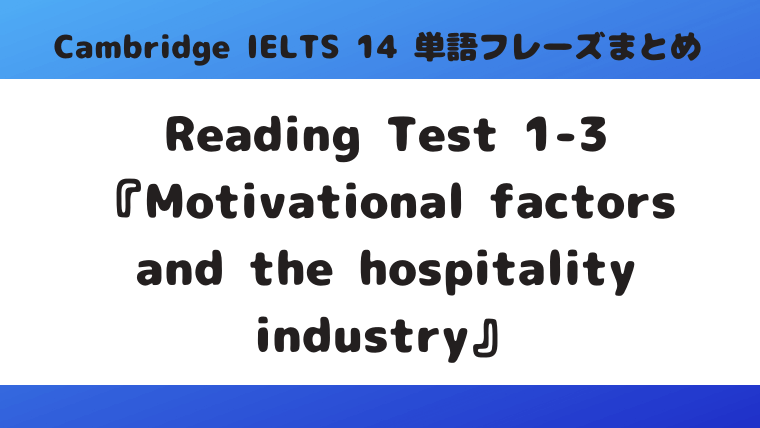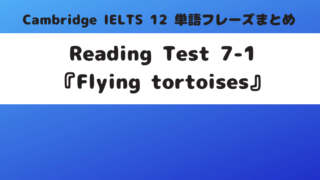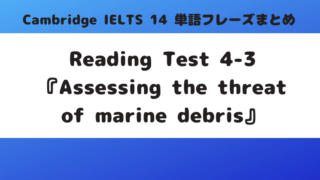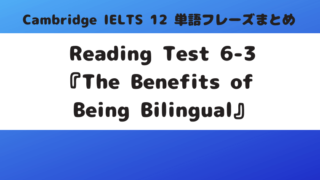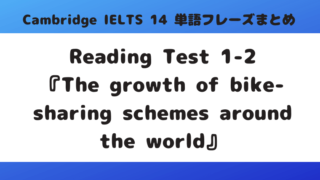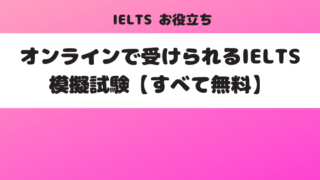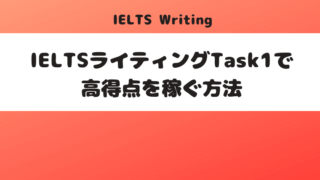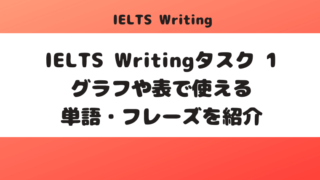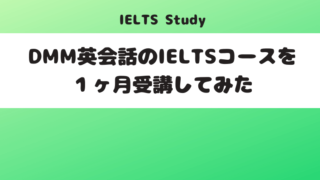「Cambridge IELTS 14」Reading Test1-3『Motivational factors and the hospitality industry』の単語・フレーズをまとめました。
私がIELTS Readingの単語・まとめを行う理由は「Cambridge IELTS Reading単語・フレーズまとめ」からご覧ください。
Reading Test 1 Passage 3:Motivational factors and the hospitality industry
- superior
adjective /suːˈpɪə.ri.ər/
・better than average or better than other people or things of the same type:
・disapproving A superior person believes that or acts as if they are better than other people
1 優れた, 勝った
反意 inferior
2 《名の前でのみ》 〘フォーマル〙 上質の, 上等の
反意 inferior
3 〘けなして〙 <人・声・態度などが> 傲慢(ごうまん) な, 偉ぶった
4 《名の前でのみ》 (地位が) 上位の, 上級の
5 《名の前でのみ》 (軍隊・軍事力などが) 優勢な, 優位な
反意 inferior
6 《名の前でのみ》 〘専門〙 (体の部位が) 上位の, 上部の 同意 upper 反意 inferior
(実践IELTS英単語3500:1079) - accomplished
adjective /əˈkʌm.plɪʃt/
skilled
1 堪能(たんのう) な, 優れた
2 an accomplished fact 〘フォーマル〙
既成事実
(実践IELTS英単語3500:1393) - originated from
~が起源である - possess
verb /pəˈzes/
・to have or own something, or to have a particular quality
・(of a wish or an idea) to take control over a person’s mind, making that person behave in a very strange way
1 〘フォーマル〙 <貴重な物など> を所有する, <違法な物> を所持する
2 〘フォーマル〙 <才能・性質など> を有する
3 〘文〙 <感情が> <人> を襲う
4 <悪霊などが> <人> にとりつく
(実践IELTS英単語3500:688) - substance
noun /ˈsʌb.stəns/
・material with particular physical characteristics:
・the most important part of what someone has said or written:
・importance, seriousness, or relationship to real facts
1 《C》 (一般に) 物質, 物
2 the substance of something
〘フォーマル〙 <文章・発言など>の趣旨
3 《U》 〘フォーマル〙 重要性, 内容
同意 significance
4 《U》 〘フォーマル〙 真実
(実践IELTS英単語3500:553) -
foster
verb /ˈfɒs.tər/
・to take care of a child, usually for a limited time, without being the child’s legal parent:
・to encourage the development or growth of ideas or feelings:
1 《他》 〘フォーマル〙 <技術・精神など> をはぐくむ, 育成[促進]する
同意 encourage, promote
2 a) 《他》 <他人の子供> を里親として養育する
b) 《自》 里親として養育する → adopt
(実践IELTS英単語3500:1584) - managerial
adjective /ˌmæn.əˈdʒɪə.ri.əl/
relating to a manager or management
《通例名の前で》 管理(者)の, 経営(者)の
(実践IELTS英単語3500:2512) - turnover
noun /ˈtɜːnˌəʊ.vər/
・the amount of business that a company does in a period of time:
・the rate at which employees leave a company and are replaced by new people:
・a small cake made from a folded piece of pastry with fruit inside:
1 《U, a/the ~》 (staff turnover とも) 離職率, 労働移動率
2 《U, a/the ~》 英 (一定期間の) 売上[取引]高
3 《U, a/the ~》 (商品の) 回転率
4 《C》 ((果物・肉・野菜などを入れて折り返したパイの一種))
5 《C》 (フットボール,バスケでの) ターンオーバー ((ボールが相手側に渡ること))
(実践IELTS英単語3500:1531) - recurring
adjective /rɪˈkɜː.rɪŋ/
・happening many times, or happening again:
・mathematics specialized (of a number) repeating itself for ever following a decimal point:
1 《名の前でのみ》 再発する, 繰り返し起こる
同意 recurrent
2 〘専門〙 (小数点以下の数が) 循環する - compensation
noun /ˌkɒm.penˈseɪ.ʃən/
・money that is paid to someone in exchange for something that has been lost or damaged or for some problem:
・something that makes you feel better when you have suffered something bad:
・the combination of money and other benefits (= rewards) that an employee receives for doing their job
1 《U》 賠償金, 補償金
2 《C, U》 埋め合わせ, 償い
3 米 (役員の) 報酬
4 《C》 a compensation for something
<…>の代償行動
(実践IELTS英単語3500:2117) -
inadequate
adjective /ɪˈnæd.ɪ.kwət/
・not good enough or too low in quality:
・too small in amount:
・not confident enough to deal with a situation
1 不十分な, 不適切な, 不備な
反意 adequate
2 力不足の, 劣等感を持った - morale
noun /məˈrɑːl/
・the amount of confidence felt by a person or group of people, especially when in a dangerous or difficult situation
(集団の) 士気
(実践IELTS英単語3500:2542) - succinct
adverb /səkˈsɪŋkt.li/
in a way that expresses what needs to be said clearly and without unnecessary words
簡明な, 簡潔な - predisposition
noun /ˌpriː.dɪs.pəˈzɪʃ.ən/
the state of being likely to behave in a particular way or to suffer from a particular disease:
1 傾向, 意向
2 (特定の病気にかかる) 素因 - sophisticated
adjective /səˈfɪs.tɪ.keɪ.tɪd/
・having a good understanding of the way people behave and/or a good knowledge of culture and fashion:
・intelligent or made in a complicated way and therefore able to do complicated tasks
1 <機械・装置・技術などが> 精巧な, 高性能の, 高度な
2 <人・言動などが> 洗練された, 教養のある
3 <物などが> あか抜けした, しゃれた
4 (問題などに) 通じている, 見識のある
5 <システム・方法などが> 複雑な, 手の込んだ
反意 unsophisticated
(実践IELTS英単語3500:1545) - in a real sense
本当の意味で、事実上 - dichotomy
noun /daɪˈkɒt.ə.mi/
a difference between two completely opposite ideas or things:
二分される違い, 二項対立 - retain
verb /rɪˈteɪn/
・formal to keep or continue to have something:
・formal If a substance retains something, such as heat or water, it continues to hold or contain it
・law specialized to get the services of a lawyer by paying them before you need them
1 <性質・権利など> を保つ, 維持する
2 <書類など> を保管する
3 <熱・水分など> を保つ, 逃さない
4 <情報など> を忘れないでいる
5 <従業員など> をつなぎ止めておく
6 <弁護士など> を雇っておく
(実践IELTS英単語3500:1058) - competent
adjective /ˈkɒm.pɪ.tənt/
able to do something well
1 有能な, 力量のある
反意 incompetent
2 適当な, 十分な, まずまずの
3 正常な知能を有する
4 《名の前不可》 〘法〙 be competent to do something
<…>する(法的)権限がある
(実践IELTS英単語3500:1672) - extrinsic
adjective /ekˈstrɪn.zɪk/
・coming from outside, or not related to something:
・medical specialized coming from outside the body:
外的な, 外因性の
(実践IELTS英単語3500:3268) - intrinsic
adjective /ɪnˈtrɪn.zɪk/
being an extremely important and basic characteristic of a person or thing:
本質的な, 本来備わっている
(実践IELTS英単語3500:2616) - explore
verb /ɪkˈsplɔːr/
・to explore space
・to think or talk about something in order to find out more about it
1 a) 《他》 <未知の地域> を探索[探検]する
b) 《自》 探索[探検]する
2 《他》 <考え・方法など> を検討する, 探る
同意 consider, investigate
3 《他》 〘書き言葉〙 (触感で) …を調べる, 確かめる
(実践IELTS英単語3500:544) - aligned
verb /əˈlaɪn/
to put two or more things into a straight line:
1 手を組んだ, 提携した
2 きちんと並んだ
3 調整された
(実践IELTS英単語3500:3194) - adequate
adjective /ˈæd.ə.kwət/
・enough or satisfactory for a particular purpose
1 十分な, 適切な
同意 sufficient 反意 inadequate
2 まあまあよい, まずまずの
(実践IELTS英単語3500:1514)
